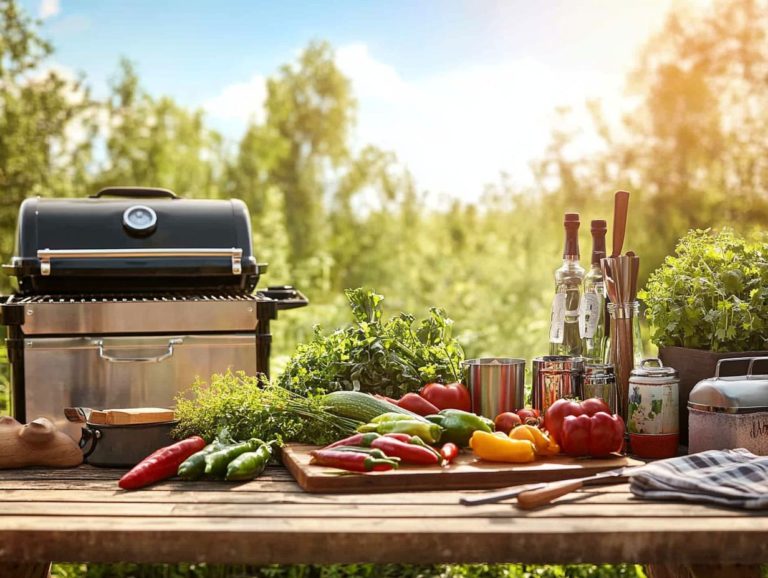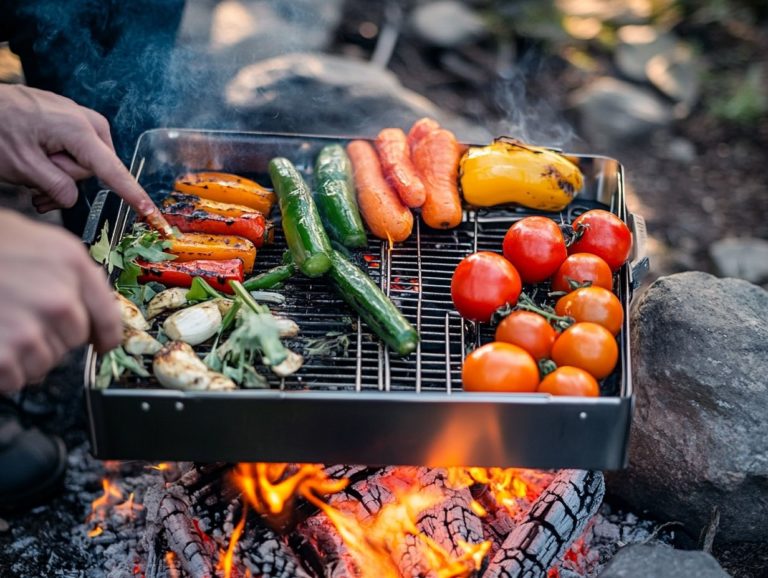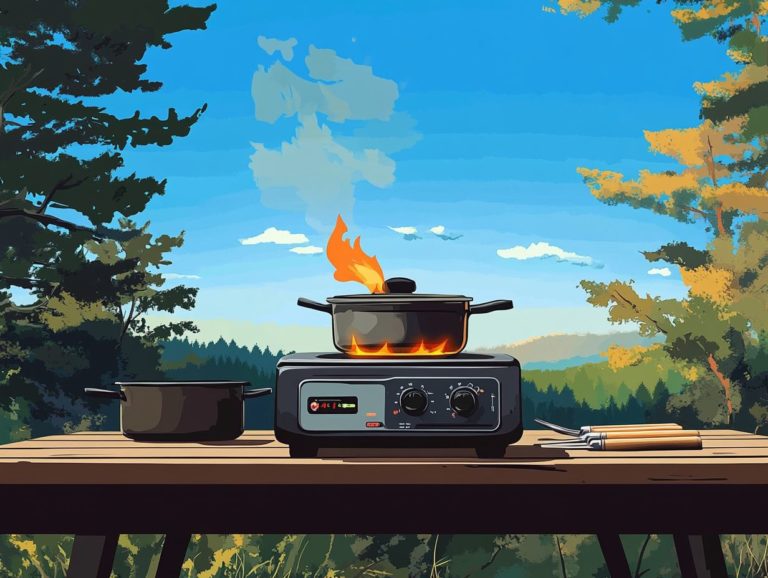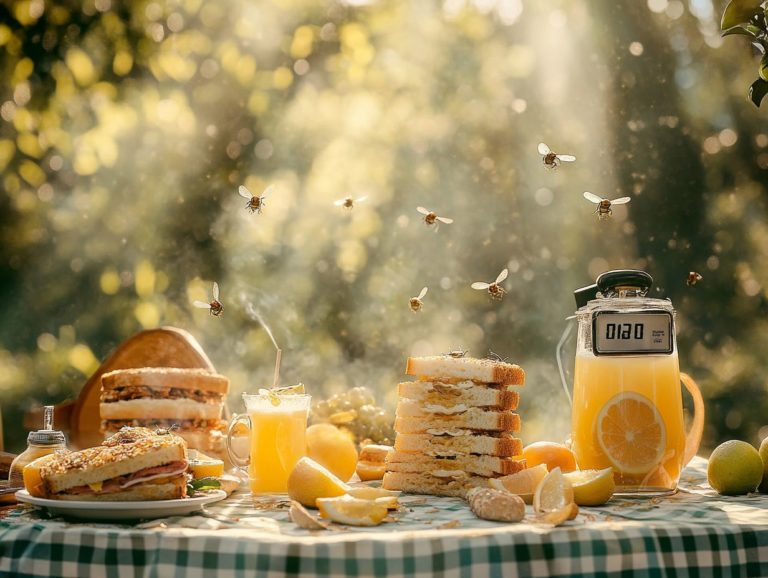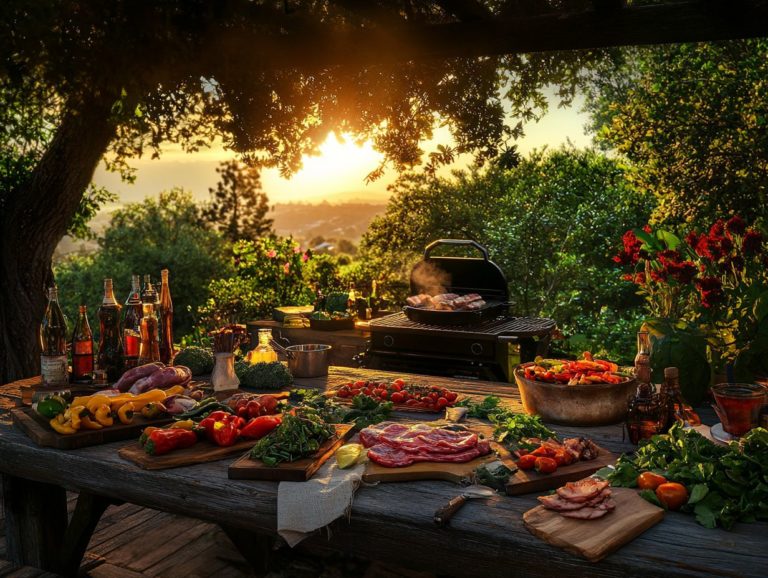How to Keep Your Cooking Gear Clean While Camping
Contents
- Key Takeaways:
- Importance of Keeping Cooking Gear Clean While Camping
- Essential Cleaning Supplies for Camping
- Cleaning and Disinfecting Techniques
- Proper Storage and Maintenance of Cooking Gear
- Dealing with Limited Resources
- Preventing Contamination and Foodborne Illnesses
- Frequently Asked Questions
- 1. How do I keep my cooking gear clean while camping?
- 2. Can I use dish soap to clean my cooking gear while camping?
- 3. What should I do if my cooking gear gets greasy while camping?
- 4. How often should I clean my cooking gear while camping?
- 5. What’s the best way to store my cooking gear while camping?
- 6. Can I use a dishwasher to clean my camping cooking gear?
Key Takeaways:
- Regularly cleaning and disinfecting cooking gear is vital for health and safety while camping.
- Pack essential cleaning supplies and follow step-by-step techniques to clean and disinfect cooking gear properly.
- Proper storage and maintenance of cooking gear and following food safety practices can prevent contamination and foodborne illnesses.
Importance of Keeping Cooking Gear Clean While Camping
Cleaning cooking gear while camping is essential for protecting the health and safety of everyone involved. Good hygiene stops foodborne illnesses. It also helps protect the environment.
A clean outdoor kitchen enhances your camping experience and reduces the risk of food contamination. It aligns with Leave No Trace principles, promoting practices that respect nature.
Using biodegradable soap and managing food waste properly will improve your outdoor cooking experience without compromising health.
Health and Safety Considerations
Health and safety are critical when cooking while camping. Inadequate cleanup can lead to foodborne illnesses that ruin outdoor fun.
Campers should pay attention to proper handwashing, utensil sanitation, and cleaning cooking surfaces to prevent bacteria growth. Cook food to the appropriate temperatures to eliminate pathogens often found during food preparation.
Essential Cleaning Supplies for Camping
Having essential cleaning supplies is crucial for maintaining hygiene and keeping the camp kitchen clean and functional.
Items like biodegradable soap, a scrubbing brush, and a pot scraper make cleaning efficient and eco-friendly. These tools help uphold outdoor ethics while adhering to Leave No Trace principles.
What to Pack for Easy Clean-Up
A well-organized packing list makes cleanup easy. This enhances your camping experience by ensuring you have the necessary supplies to maintain a clean campsite.
For instance, a portable camping sink simplifies washing up after meals. When used with biodegradable soap, it minimizes harm to the environment while promoting cleanliness. Storage containers are also essential for keeping food organized, preventing spills, and deterring wildlife.
Items like dish towels, sponges, and trash bags facilitate cleanup, allowing for a quick and hassle-free departure from your outdoor home!
Cleaning and Disinfecting Techniques
Effective cleaning and disinfecting techniques are essential for a hygienic camp kitchen. Camp kitchens often involve cooking over a campfire, so implementing proper practices is crucial.
Utilizing gray water systems—a method for recycling water used in washing dishes—and selecting suitable cleaning products will keep cooking equipment in good condition, ensuring a safe environment for food preparation.
We’d love to hear your camping cleaning tips! Share your ideas and help create a community of outdoor enthusiasts committed to cleanliness and safety.
Step-by-Step Guide for Cleaning Different Types of Cooking Gear
A step-by-step guide for cleaning different types of cooking gear is essential for campers. It helps ensure the longevity and effectiveness of their cooking supplies, especially specialized items like cast iron cookware.
By following a few simple techniques, you can maintain the integrity of these essential tools and keep them ready for your next adventure. Understanding the unique care requirements for each type of gear, such as utensils and non-stick pans, will make the dishwashing process more efficient and enjoyable.
For example, cast iron should never be exposed to soap or harsh scrubbing. This can strip away the protective layer that keeps food from sticking, leading to rust and food sticking. Instead, a gentle scrub with hot water and a stiff brush is effective. It’s crucial to dry it immediately to prevent rust.
These methods ensure that each piece of cooking gear is well cared for, ready to help you create culinary delights in the great outdoors.
Proper Storage and Maintenance of Cooking Gear
Proper storage and maintenance of cooking gear are essential for preserving the quality and functionality of your camping supplies. This ensures they are ready for your next outdoor adventure.
This involves organizing lightweight gear to prevent damage and facilitate easy access. Maintaining a comprehensive packing list will also help you avoid forgetting any essential items.
Quick Tips for a Sparkling Clean Camp Kitchen!
Simple tips for keeping your camping gear clean can enhance your overall experience and extend the life of your cooking supplies. Regularly inspect your pots, pans, and utensils for any damage to avoid larger issues in the future.
Use antimicrobial sponges during cleaning to effectively kill germs and help prevent foodborne illnesses. After each use, wash all cooking gear with hot, soapy water and dry it properly to eliminate moisture that can encourage mold and unpleasant odors.
These practices are essential for maintaining the cleanliness and functional integrity of your cooking equipment. They ultimately improve your enjoyment on future camping trips!
Dealing with Limited Resources
Keeping your camp kitchen clean is essential for a fun and healthy experience, especially when resources are limited. Proper sanitation while camping is vital but can be challenging in backcountry settings or with restricted supplies.
Eco-friendly washing methods, such as using gray water and biodegradable soap, are effective cleaning hacks that enable campers to keep their cooking gear clean while adhering to environmental ethics.
Cleaning Hacks for Camping
Cleaning hacks can greatly simplify the dishwashing process while camping. They allow you to quickly wash your cooking utensils and maintain cleanliness at the campsite. By incorporating proper techniques into your outdoor routine, you can enjoy delicious meals without the hassle of a messy cleanup afterward.
One essential tip is to use biodegradable soap, which is environmentally friendly and gentle on the delicate camping ecosystem. Implement a two-basin system for washing and rinsing to streamline the process.
Use a wet cloth to wipe off utensils before dipping them into the cleaning solution. This helps conserve water, especially for those with limited supplies. Don’t underestimate the power of a scrub pad; it effectively tackles tough residue, ensuring your gear stays clean and ready for your next adventure!
Preventing Contamination and Foodborne Illnesses
A camper’s primary concern with outdoor cooking is preventing contamination and foodborne illnesses. Improper food handling and cleanup can pose serious health risks.
By following best practices for food safety and ensuring thorough dishwashing of all cooking supplies, campers can safeguard their health while enjoying their outdoor culinary experiences.
Keep these tips in mind and enjoy hassle-free cooking on your next camping trip!
Best Practices for Food Safety
The importance of using best practices for food safety while camping lies in reducing health risks and enhancing the overall cooking experience in nature. Understanding proper food handling techniques, such as maintaining hygiene, cooking food thoroughly, and storing food correctly, ensures that meals are safe and enjoyable during camping trips.
Practicing outdoor ethics helps maintain a healthy environment and fosters a deeper connection with nature. Techniques like pre-cooking meals and using cooler packs alleviate concerns about food spoilage, allowing campers to focus more on the adventure ahead.
Using these tips gives you more chances to gather around the campfire and create unforgettable memories while ensuring safety and responsibility.
Frequently Asked Questions
1. How do I keep my cooking gear clean while camping?
The best way to keep your cooking gear clean is to rinse it with hot, soapy water after each use. Scrub off any food particles and dry it completely before storing.
2. Can I use dish soap to clean my cooking gear while camping?
Yes, dish soap is safe for your camping cooking gear. Just rinse it thoroughly and dry it completely to prevent any soap residue from affecting the taste of your food.
3. What should I do if my cooking gear gets greasy while camping?
If your cooking gear gets greasy, use a mild degreaser or a paste made of baking soda and water to scrub it clean. An anti-microbial sponge or a scrubbing brush can also help. Rinse and dry completely before storing.
4. How often should I clean my cooking gear while camping?
It’s best to clean your cooking gear after each use, especially after campfire meals or cooking adventures. If camping for an extended period, you may need to clean it every few days. Always dry it thoroughly before storing to prevent mold or mildew growth.
5. What’s the best way to store my cooking gear while camping?
To prevent contamination, store your cooking gear in a sealed container or bag, such as a plastic storage container. Clean and dry it before storing, and keep it in a cool, dry place. Consider using lightweight gear for easier transport.
6. Can I use a dishwasher to clean my camping cooking gear?
It’s not recommended to use a dishwasher for camping cooking gear, as high temperatures and harsh detergents can damage it. Stick to hand washing with hot, soapy water and biodegradable soap, especially when managing gray water.
Start planning your next adventure with these food safety tips in mind!

